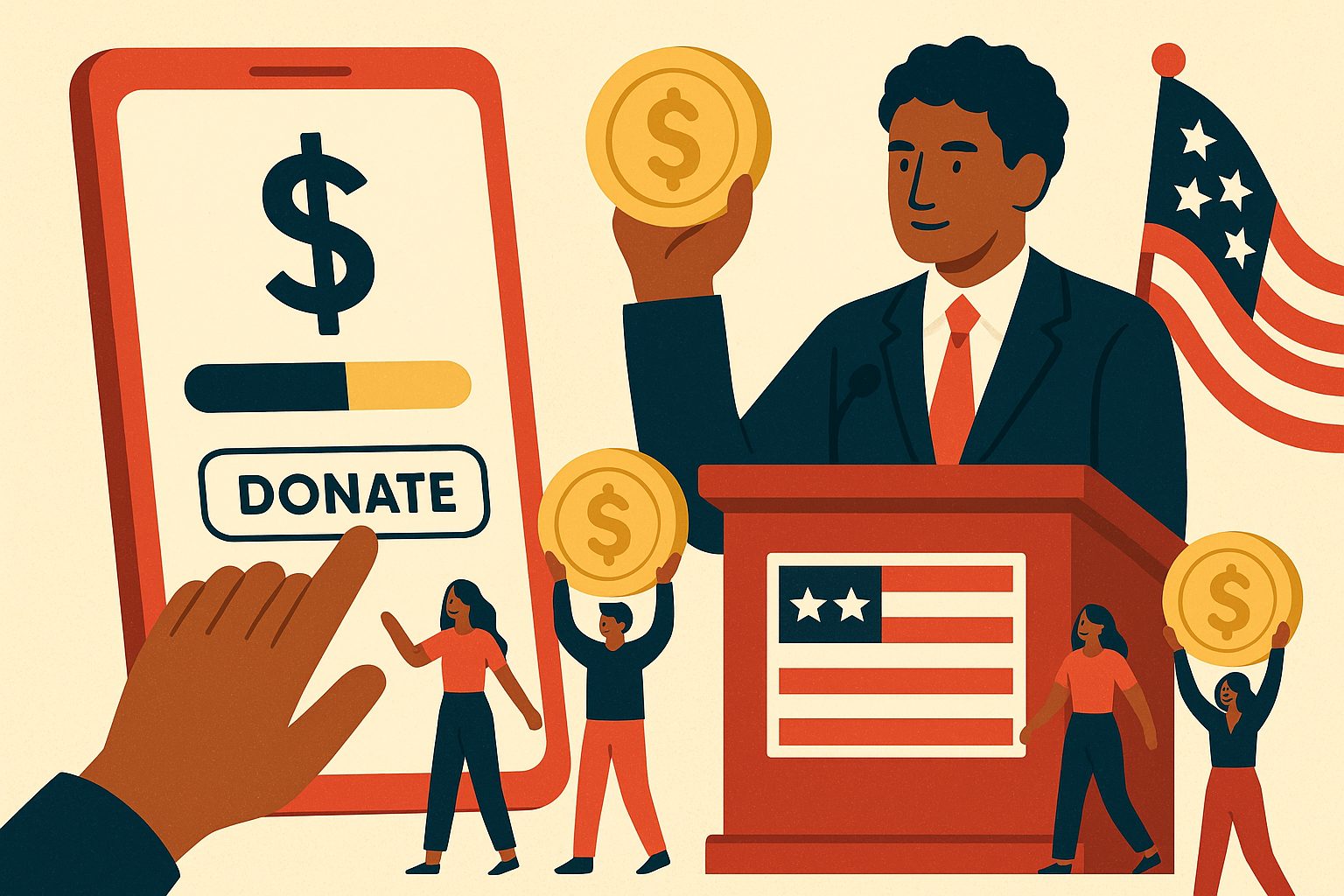Reimagining Campaign Finance in the Digital Age
The rise of political crowdfunding has fundamentally reshaped how candidates run for office. What once required deep-pocketed donors, exclusive fundraisers, and complex donor networks can now be powered by the grassroots—one small donation at a time. Platforms like ActBlue, WinRed, GoFundMe, and Givebutter have opened the gates for everyday people to participate in campaign financing, creating a new era of democratic engagement. But as powerful as this new model is, it also comes with a complex web of ethical challenges that candidates, donors, and platforms must navigate. Political crowdfunding, when done right, empowers communities and fuels transparency. When mishandled, however, it can exploit trust, amplify misinformation, and skirt accountability. Ethics in this space isn’t just a matter of compliance—it’s a cornerstone of credibility. As digital donations become the lifeblood of modern campaigns, understanding the ethical terrain has never been more essential.
The Power and Pitfalls of Transparency
One of the greatest promises of political crowdfunding is transparency. Unlike traditional campaign finance structures that rely on large donors or PACs operating in the shadows, crowdfunding puts names and numbers out in the open. Supporters can see who else is backing a candidate and judge the breadth and diversity of their support base. But with this openness comes an ethical responsibility to tell the truth—consistently and clearly. Candidates must ensure that the way they present their fundraising goals, donation usage, and campaign outcomes is accurate and honest. Inflated claims or vague promises can damage credibility and lead to backlash. Donors aren’t just giving money—they’re buying into a vision. Misleading them erodes the foundational trust that grassroots fundraising depends on. At its best, transparency builds trust. At its worst, it becomes a mask for manipulation. Campaigns must take care to ensure that the image they project online matches their intentions and actions on the ground.
Telling Authentic Stories Without Exploiting Emotion
Storytelling is at the heart of effective crowdfunding. Donors give not just because they agree with a candidate’s policies, but because they connect with their story. Sharing one’s personal background, challenges, and reasons for running can galvanize support in powerful ways. Yet there’s a fine ethical line between being authentic and being exploitative. Campaigns must be especially mindful when discussing sensitive topics such as personal trauma, systemic oppression, or the struggles of marginalized communities. Using emotionally charged stories to provoke donations is only ethical when it’s done with integrity and consent. Candidates must ask themselves whether the story being told is necessary, truthful, and respectful. Is it elevating the cause or commodifying pain? Are individuals being portrayed with dignity or reduced to campaign props? These questions are vital, especially in a political climate where optics can overtake outcomes. Ethical storytelling amplifies truth and humanity; unethical storytelling turns real lives into clickbait.
Who Gets Seen and Who Gets Funded
While crowdfunding is often praised for its inclusivity, it can just as easily reflect and reinforce systemic inequities. Campaigns with polished videos, professional photography, and strong social networks are far more likely to succeed. This means candidates from underrepresented or economically disadvantaged backgrounds may struggle to compete—not because they lack vision or leadership, but because they lack access to digital resources. Algorithms on major platforms also tend to favor campaigns that are already gaining traction, creating a snowball effect that benefits the already-visible. The ethical dilemma here lies in visibility bias. If platforms do not actively work to elevate diverse voices, they risk perpetuating inequality under the guise of democratization. It’s not enough to provide access to tools; campaigns need equitable exposure and support. Candidates must also reflect on their own privilege in the crowdfunding space. Who is promoting their content? Who is amplifying their voice? Ethical crowdfunding means working actively to create an inclusive playing field—not just for donors, but for every aspiring candidate.
Campaign Finance Laws Meet Digital Innovation
The legal framework for campaign finance wasn’t built for the digital age. As crowdfunding has surged, regulations have often struggled to keep up. This disconnect creates a gray area where ethical considerations must step in. Candidates must understand and comply with rules around contribution limits, donor disclosures, and how funds can be used—even if the platform itself doesn’t enforce them. But legality doesn’t always equal morality. A campaign might legally accept an anonymous donation under a certain threshold, but ethically, should it? If a platform enables recurring donations by default, is the campaign responsible for ensuring donors understand what they’ve opted into? Ethical candidates don’t just follow the letter of the law—they aim to exceed it. By setting higher standards for transparency, accountability, and donor communication, campaigns can build long-term trust. Regulatory bodies may catch up eventually, but ethical leadership in crowdfunding sets the tone now.
Recurring Donations and Donor Consent
Recurring donations are a powerful tool for building financial stability in a campaign, but they come with ethical obligations. It’s essential that donors fully understand what they’re signing up for. Clear language, opt-in features, and confirmation messages are a must. Unfortunately, some platforms and campaigns make recurring contributions the default setting, leading to confusion, accidental donations, and frustration. This not only jeopardizes trust, it creates unnecessary financial stress for well-meaning supporters. Ethics in this area are simple: informed consent should guide every transaction. Donors should feel empowered to give, not tricked into continuous payments. Campaigns must audit their donation forms, test them from the perspective of a first-time user, and ensure that clarity overrides pressure. A campaign that values donor trust more than short-term gain will not only keep supporters—it will turn them into lifelong advocates.
Misinformation, Virality, and the Ethics of Going Viral
Crowdfunding campaigns often rely on social media to generate traffic, donations, and visibility. But the same tools that help a campaign go viral can also spread misinformation at unprecedented speed. A single misleading tweet or out-of-context video can rack up thousands of shares before corrections can be made. In the race to raise funds, there can be temptation to oversimplify complex issues, exaggerate opponents’ actions, or create urgency through half-truths. This is where ethical integrity must step in. Going viral should not come at the expense of being honest. Candidates must fact-check their content, cite sources, and take responsibility for their narratives. They must also be willing to correct the record when mistakes are made. Misinformation not only undermines public discourse—it poisons the well for every other candidate relying on genuine crowdfunding support. Ethical campaigns view virality as a bonus, not a strategy built on distortion.
Platform Responsibility and Digital Gatekeeping
Crowdfunding platforms themselves are not neutral. The way they design their interfaces, set defaults, and enforce policies shapes how campaigns operate. Ethical dilemmas arise when platforms prioritize revenue over user experience or allow disinformation and hate campaigns to flourish unchecked. Campaigns that operate within these systems must be conscious of the ethical compromises they may be making. Is the platform enforcing community guidelines fairly? Is it providing tools for transparency and communication? If not, are there alternatives that better align with the campaign’s values? Platforms also bear responsibility for content moderation, donor privacy, and financial transparency. Ethical crowdfunding demands collaboration between candidates and platforms to ensure that fundraising is not just effective—but also just, equitable, and aligned with democratic values. Pressure from users and public scrutiny are pushing platforms to evolve, but campaigners must stay vigilant and demand accountability from the digital spaces they use to fund their movements.
The Emotional Toll of Fundraising
Crowdfunding is emotionally labor-intensive. Candidates, especially those running on justice-oriented platforms, are often expected to be constantly available, vulnerable, and energized. Sharing one’s story repeatedly, responding to hundreds of messages, and constantly promoting the campaign can lead to burnout and emotional exhaustion. There’s an unspoken pressure to perform struggle in ways that garner sympathy and donations. This emotional toll is rarely acknowledged in public discourse, but it’s a crucial ethical consideration. Candidates must create boundaries, seek support, and be honest about what they can sustainably give. They should never feel forced to commodify their pain or trauma to be seen as “authentic.” Donors, too, must recognize that access does not equal entitlement. Respecting a candidate’s emotional labor and personal boundaries is part of building an ethical campaign community. Crowdfunding with care—toward oneself and one’s audience—is not weakness; it’s wisdom.
Building a Culture of Ethical Giving
Ethical crowdfunding isn’t just the responsibility of candidates—it also involves donors, supporters, and allies. Donors must reflect on why they give, how they engage with campaigns, and what impact their contributions are having. Are they supporting candidates who share their values? Are they spreading factual information? Are they pressuring candidates in ways that align with mutual respect? Campaigns can foster this culture by being transparent, expressing gratitude, and inviting feedback. Supporters who feel informed and respected are more likely to remain loyal, donate again, and advocate for the candidate within their own networks. Ethics and community go hand in hand. Crowdfunding is more than a financial model—it’s a political relationship built on trust, shared values, and accountability. Nurturing that relationship ensures that campaigns don’t just win dollars—they win hearts, minds, and long-term momentum.
Ethics as Strategy, Not Obstacle
In a world that moves fast and rewards bold messaging, ethics can sometimes feel like a limitation. But the truth is, ethical crowdfunding is not a hindrance—it’s a strategic asset. Campaigns that lead with integrity build stronger donor bases, earn media credibility, and develop more sustainable organizations. They’re less likely to be derailed by scandal, donor mistrust, or public backlash. Ethics builds resilience. It creates a campaign culture that’s aligned from the inside out. In the long game of political leadership, how you win matters just as much as whether you win. Candidates who build ethically sound crowdfunding campaigns are also building a foundation for the kind of leadership we need—transparent, accountable, and rooted in community.




